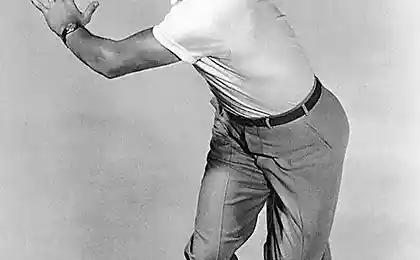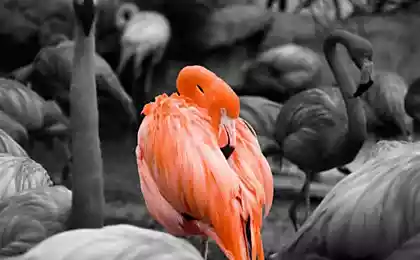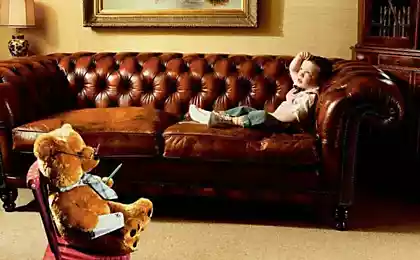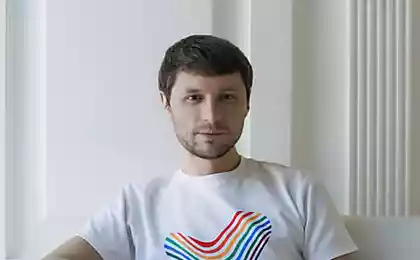1153
"Do what you love" - is terrible advice or a realistic career option?

When we grew up, we were told that we could be anyone - the astronauts, artists, tamers unicorns. But later we return to the other reality, and we hear the phrase: "stop head in the clouds", "start thinking about careers» ...
Jenna Martin (Jenna Martin) - fine art and underwater photographer, as well as Master in psychology from Billings, Montana, where she lives with her fiance Chris, two dogs and four cats. Two years ago, Jenna abruptly changed career in photography and has been creating surreal images. She shared her thoughts in response to an article in which he called for "the selection of financially viable profession" without taking into account hobbies, talents and passions. As the experience will lead to mastery of which supposedly will and passion.
I recently read a quote an article entitled "Do what you love" - is terrible advice »(« Do What You Love »Is Horrible Advice):« It is easy to confuse a hobby or interest from the deep passion that will lead to the choice of profession and career. The reality is that such early enthusiasm rarely securities ».
Well ... no.
If you do not read this article, you can follow the link and read it ... but better not. The author of a good writer, he has many other great texts, but this was ... a blatant error. I tried to reassure myself that it's just one of those unfortunate things, rotating the Internet, but it "gnawed" me. How many potential artists today are ruining their dreams, because they read on the Internet such articles?
I hope not much, but, nevertheless, the idea of some teenager who sells his guitar, because too many people had told him that music is a "hobby" rather than a career choice, just kills me.
People have a right to their own opinion, right?
That is, so I'm going to express their.

Unconditional support could quickly disappear ...
When we grew up, we were told that we could be anyone. We were told that we can be astronauts, artists, tamers unicorns and all that will come up with our little minds. 5-year-old child proudly proclaimed that will "rock star", and adults smiled and said: "Oh my God, honey, of course, you will become!»
But later we return to the other reality. We are beginning to hear the phrase "stop head in the clouds", "Start thinking about a career." The idea to follow his passion becomes a joke, and we are told that art, whatever that may be the manifestation of this hobby. Users list the innumerable list of things that they "passionately fond", but for which could never receive payment. Then you bring down the mountain of statistics, saying that "you have a better chance of getting struck by lightning" than to succeed in what you're doing. Is it true?
That's right ...
It put forward two arguments: 1) Passion itself to nothing lead, and 2) Where is the market? If no one you will not pay for it, even when you are doing their job very well, the way you make a living?
And I have them there are two answers: 1) The concept of talent and enthusiasm is widely mistaken and 2) The market is always there.
Now, many will say that I crossed the border and finally reached the point where the advice that I give to artists experiencing the development and formation, will bring more harm than good. What's in this era of realism, dreams serve a single goal - to brilliant tales we tell to their children until they reach maturity for a marketing *. And then, cynical grin, hand them a spatula and application for a job, "Life is not fair, dare».
Well, f * ck that - and here's why.

1. Talent and passion is not what you think
Talent - no more than just a word that people use to describe the skill level of the person when they have personally seen the process of gaining skills and skill development. Musicians, dancers, artists - you've seen them work when they first started? It was crap. They do not fall into the music, both feet were left, and they could not paint a straight line.
They were absolute, the
In fact, they spent a lot of hours of time before everyone started to say, "Wow, you have a real talent».
The fact that some people are naturally drawn to a box of crayons instead of a calculator, but the act of creating a work of art is also a skill, so you need the acquisition of skills.
Actually, many of the features that we perceive as natural personality traits (ie, willpower, creativity, attention) is skills; all of which can be consciously developed in practice.
A short digression - I assure you, I would love to peer-reviewed journals referred to a list of relevant scientific evidence for all of these applications, but now 3:30 am and I have no desire. But I tell you that I personally studied all this, received master's degree in psychology, specializing in neurological processes, and mental health. If you do not believe me, ask any professor of psychology
So what is the fascination?
This word overused in modern speech. The man says: "I am incredibly passionate about rock music." When in fact he has in mind: "I really liked the band at a concert which I attended last week».
Passion is not only a love for something, it's an obsession, which encourages people to practice a certain activity is unrealistic for a long time. People are quite right, listing you as examples a lot of things that they are "passionate", but for which they would never have paid! But this is not true addiction. It's just what they love ... as a hobby.
If the photo - your dream job, but you devote to it the same amount of time as any other hobby, you will not be able to find those who are willing to pay you for it. If you are truly passionate about shooting, you spend every spare moment to improve your photo skills. You'll stay up late on YouTube, learn different lighting systems and methods for image editing. Learn tinkering own mechanisms that originally cost too much (for example, an underwater housing for the camera), start to attend classes and seminars, you will find the extra time to further develop their skills.

Simply put, the true passion will make you wish to make an abnormal amount of work to succeed in a particular skill in craftsmanship, switched to a new, demanded level.
The main thing is that you already have the most important tool to achieve results. What you need now is practice and time.
Now, regarding the second point ...
2. The market has always
Said article (along with countless others, had swept the Internet) raises a question that you should ask yourself about the job of his dreams: "And will I pay for it?»
But this is not the correct formulation of the question. Instead, you need to ask yourself: "How can I prove to people that for my work is worth paying?»
We will understand more. I think we all have heard about this phrase: "Well, maybe you still get a degree in Accounting or more of a specialist. You know ... just in case ».
We constantly give advice, "just in case" to prepare for an inevitable failure.
But no one says accountant to get another profession, "just in case." Nobody ever says medical student, that perhaps he should learn welding, or construction, or trade skills, in the event that it was something to "lean».
The fact that people only pay for what they want, or for what is needed. And when your passion lies in the region, where he meets a clear need on the part of the market, the consequences are acceptable. People need doctors. There is a need for accountants. Demand and supply; everything is logical.
Art, on the other hand ...
Art is regarded as a "want". This means that people find it difficult to understand the market if they do not belong to its target audience. If a person has never considered the possibility of buying works of art for $ 1,000, it is very difficult to talk about how someone can make a living selling art for $ 1000
But, of course, can not be a market for anything in the world ...
In fact, at the moment, you can make virtually nothing, if it will present correctly. Have you ever heard of the Naked Cowboy in New York City? Did you hear about his success? He plays the guitar and sings a song in shorts, boots and a cowboy hat.
The bottom line is that the market exists. The question is how to get out of it. Develop a strategy. Find out who your target audience? What value do you offer them? How do you explain to them that your product will bring them benefits?
I'm not saying that you can throw most of the work, to buy a set of creativity, go to watercolor and drawing lessons in the next week to start a successful career of the painter. I say that to build a career on something than you really are passionate, very real.
Make every effort to hone their skills and create a comprehensive marketing strategy to sell their skills. That's how you start a successful career doing something you love.
Your text to link ...























